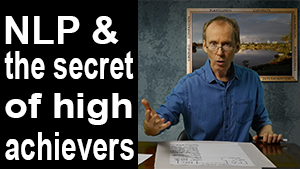
Do you want to get skilled at something but find that perfectionism holds you back? The solution could be easier than you think. Phone 07 5562 5718 or send Abby an email to book a free 20 minute telephone or Skype session. NLP, Hypnotherapy and Medtation, Gold Coast, Robina.
The number of times that you practise a task could be more important than the time that you spend practicing.
By Abby Eagle (2020)
Click the Image to Watch on YouTube
Have you ever set a goal to learn a skill and then held yourself back because you worried about how long it would take? Could be that you want to paint fine art, you want to write fiction, you want to meet people, you want to be a successful currency trader, you want to be a great speaker, you want to market your business, or maybe you want to use your NLP, Hypnotherapy and Meditation skills to help people transform their lives. In other words you want to master a skill to achieve some outcome. So what would be the best strategy?
Should the focus be on perfectionism or on doing the best that you can and completing as many projects or tasks as you can in the shortest period of time possible? Now don’t get me wrong there could be some tasks that you may need to perfect but at other times all that is required is that you have done the best that you could and then you move onto another iteration.
So rather than thinking of how long it will take to master a skill – think in terms of iterations – that is how many times you will need to practice the skill in order to achieve a satisfactory level of proficiency. In this way it shifts your focus – and with each iteration you make incremental progress – and with each iteration you get a sense of satisfaction. And then when you wake up the next morning you can look back on the number of practice sessions completed which should hopefully motivate you to keep on practising – because you don’t want to break the routine – you don’t want to break the flow cycle. So once you get into flow make sure you stay in flow – otherwise you may have to move through the struggle phase to start a new routine.
We also need to acknowledge that not all projects are created equal. Some take longer than others to complete. Let’s say that you want to a great speaker. You could spend hours writing your script and then countless hours rehearsing – and then you go and deliver your speech. And then you get back to your office and you rework the script and you spend countless more hours rehearsing and then you go deliver your second speech. Let’s say that you manage to deliver one speech every weekend. That means by the end of the year you would have delivered fifty talks.
Now Tony Robbins had a different strategy. What I think he did was to draft a script and then deliver the speech to two or three different audiences every day for a week. Where did he find the audiences? If I remember hearing him correctly he would talk to anyone who would listen – in some cases he would find an audience at a senior citizen centre. So rather than trying to master the skill before going on stage Tony was using the actual talk as an opportunity to improve his skills. In this way he was able to complete multiple iterations of the talk in a short period of time. So the focus is on completing the activity rather than on quality. So if you delivered one talk a day then by the end of the year you would have the experience of 365 talks. Deliver two talks a day and that becomes 730 talks. Do you see how this works?
Let’s use another example. Let’s say you want to be a great artist. You could spend months painting one canvas. Or you could chunk down and spend each day drawing a simple design on an A4 piece of paper. If you focus in you might be able to complete 10 drawings in one day. So that at the end of the week you could have completed 70 drawings. After a month that would be 300 drawings.
And then as your skill set increases you could begin working on small 8x10 inch canvas paintings. But then rather than spending a month trying to perfect each one you set yourself the challenge to complete one painting every day. So you set yourself the task to complete a work of art in the shortest time frame possible. The result might not be a masterpiece but with enough iterations you will eventually get there. So rather than thinking in terms of how long it will take you to master a skill, think in terms of iterations.
In a way it is similar to the pick-up-artists who suggest that you set a goal to introduce yourself to 100 women in the shortest time frame possible. It is the same with any social networking or marketing activity. Richard Bandler gave this task to a number of clients. The aim was to get 100 rejections. So the focus was not about getting a favourable response from the woman – it was just about actually walking up to a woman, saying hello and handling the rejection. That was the first step. And Bandler joked that invariably after saying hello to half a dozen women the guy got a positive response and then he was stuck because he still had to meet his target of 100 rejections.
Now let’s use Currency Trading as an example. Those people who trade the Forex currency markets have to learn how to use their computer software – they have to learn how to read the charts – then they have to learn how to make practice trades and at the same time they have to treat the trades as-if they were real trades. The same would go for an apprentice hair dresser – they have to get an understanding of how to cut and style hair – then they have to get some familiarity with their tools of trade – and then at some point they need to find people to practise on. And then at some point they go live so to speak and start working on real clients. The same would go for the currency trader. At some point they have to take the jump and risk making a live trade. So you chunk the activity into steps – into tasks – and if possible you practise each of the steps a large number of times before moving onto the next step.
So how to practise your NLP skills to bring yourself up to speed as quickly as you can? When I started learning NLP, Hypnotherapy and Meditation back in 1984 I had a lot of friends who were into personal growth. It was personal growth every day of the week 24/7. So I had to do my reading, watch videos, listen to audio tapes, attend workshops and seminars. And then I would take a book like Frogs into Princes by Richard Bandler or Heart of the Mind by Connirae and Steve Andreas – I would do the hard yards – I would read the book then reread the book and take hand written notes. Then I would write out a procedure – say for example how to elicit ideomotor signals – then I would memorise the procedure by saying it out loud for about an hour – then I would find a friend to practise on. It was not easy. I used to sweat but with each iteration the procedure became a lot easier and eventually it became hard wired.
Now it’s important that you chunk your practice sessions – so that you only have to learn one small bit – one small task at a time. Let’s say you wanted to explore past lives. So you are going to need to elicit ideomotor signals – and then elicit a timeline – then get practice in having the client float backwards and forwards over the timeline – and then stepping into and out of an event on the timeline – and then going to a neutral space just before or after the event – and so on. You can practise each small step a number of times and then you practise bringing them all together into a procedure. Does that make sense?
So rather than trying to perfect a complicated procedure the first time that you do it – rather than trying to paint a masterpiece you chunk the painting down into small steps – you practise each of the steps as many times as you can and then over time you bring them altogether.
Thanks for staying with me – please leave a comment below and feel free to join us over at the Facebook NLP Hypnotherapy Group. And if you are looking for a NLP Coach then feel free to contact me on Skype for a twenty minute free introductory session.
Share With Friends










